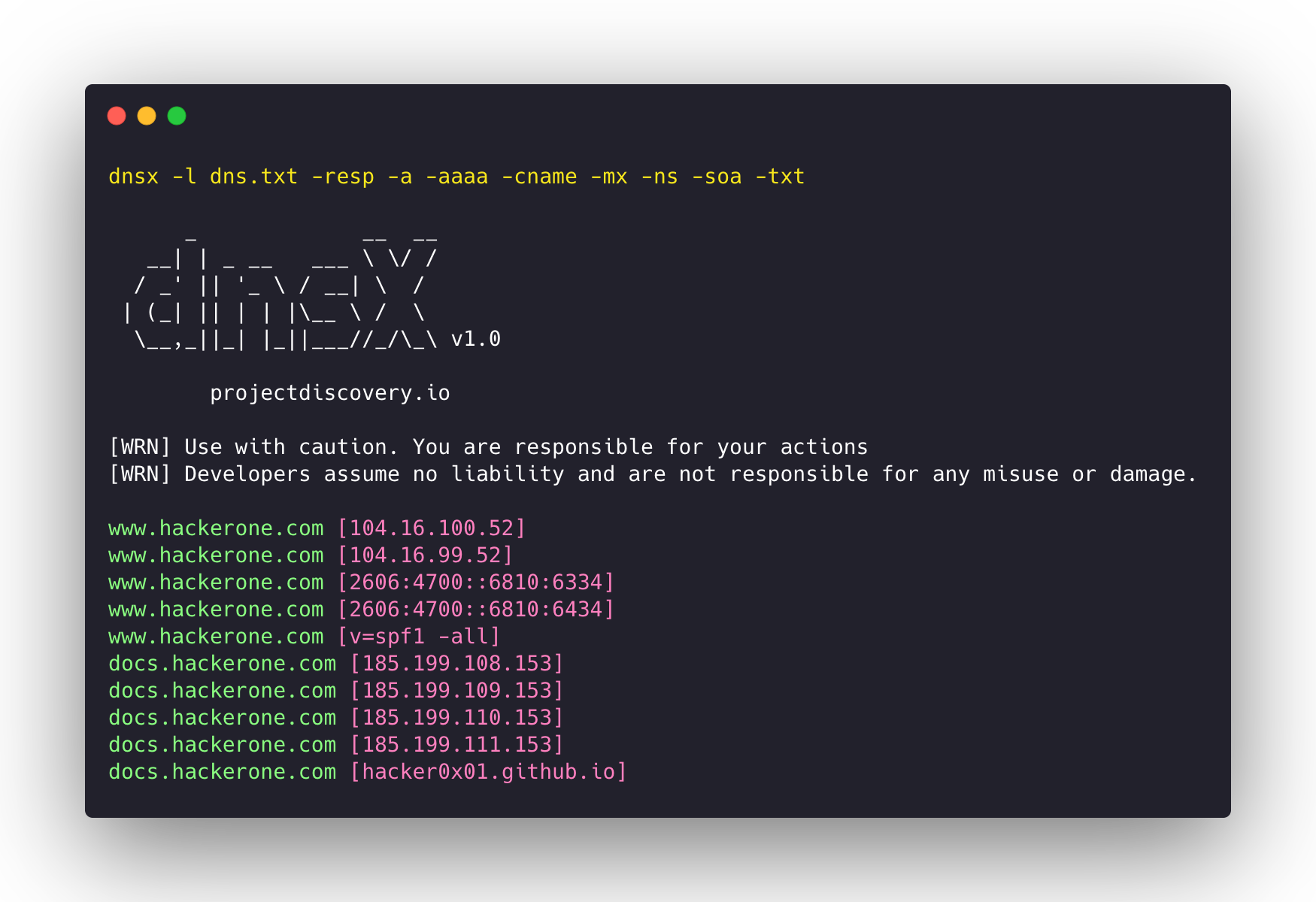Features • Installation • Usage • Running dnsx • Wildcard • Notes • Join Discord
dnsx is a fast and multi-purpose DNS toolkit allow to run multiple probes using retryabledns library, that allows you to perform multiple DNS queries of your choice with a list of user supplied resolvers, additionally supports DNS wildcard filtering like shuffledns.
- Simple and Handy utility to query DNS records.
- A, AAAA, CNAME, PTR, NS, MX, TXT, SOA query support
- DNS Resolution / Brute-force support
- Custom resolver input support
- Multiple resolver format (TCP/UDP/DOH/DOT) support
- stdin and stdout support
- Automatic wildcard handling support
dnsx requires go1.17 to install successfully. Run the following command to get the repo -
go install -v github.com/projectdiscovery/dnsx/cmd/dnsx@latestdnsx -hThis will display help for the tool. Here are all the switches it supports.
INPUT:
-l, -list string list of sub(domains)/hosts to resolve (file or stdin)
-d, -domain string list of domain to bruteforce (file or comma separated or stdin)
-w, -wordlist string list of words to bruteforce (file or comma separated or stdin)
QUERY:
-a query A record (default)
-aaaa query AAAA record
-cname query CNAME record
-ns query NS record
-txt query TXT record
-ptr query PTR record
-mx query MX record
-soa query SOA record
FILTERS:
-resp display dns response
-resp-only display dns response only
-rcode, -rc string filter result by dns status code (eg. -rcode noerror,servfail,refused)
RATE-LIMIT:
-t, -c int number of concurrent threads to use (default 100)
-rl, -rate-limit int number of dns request/second to make (disabled as default) (default -1)
OUTPUT:
-o, -output string file to write output
-json write output in JSONL(ines) format
DEBUG:
-silent display only results in the output
-v, -verbose display verbose output
-raw, -debug display raw dns response
-stats display stats of the running scan
-version display version of dnsx
OPTIMIZATION:
-retry int number of dns retries to make (default 2)
-hf, -hostsfile use system host file
-trace perform dns tracing
-trace-max-recursion int Max recursion for dns trace (default 32767)
-flush-interval int flush interval of output file (default 10)
-resume resume existing scan
CONFIGURATIONS:
-r, -resolver string list of resolvers to use (file or comma separated)
-wt, -wildcard-threshold int wildcard filter threshold (default 5)
-wd, -wildcard-domain string domain name for wildcard filtering (other flags will be ignored)dnsx can be used to filter active hostnames from the list of passive subdomains obtained from various sources, for example:-
subfinder -silent -d hackerone.com | dnsx -silent
a.ns.hackerone.com
www.hackerone.com
api.hackerone.com
docs.hackerone.com
mta-sts.managed.hackerone.com
mta-sts.hackerone.com
resources.hackerone.com
b.ns.hackerone.com
mta-sts.forwarding.hackerone.com
events.hackerone.com
support.hackerone.comdnsx can be used to print A records for the given list of subdomains, for example:-
subfinder -silent -d hackerone.com | dnsx -silent -a -cname -resp
www.hackerone.com [104.16.100.52]
www.hackerone.com [104.16.99.52]
hackerone.com [104.16.99.52]
hackerone.com [104.16.100.52]
api.hackerone.com [104.16.99.52]
api.hackerone.com [104.16.100.52]
mta-sts.forwarding.hackerone.com [185.199.108.153]
mta-sts.forwarding.hackerone.com [185.199.109.153]
mta-sts.forwarding.hackerone.com [185.199.110.153]
mta-sts.forwarding.hackerone.com [185.199.111.153]
mta-sts.forwarding.hackerone.com [hacker0x01.github.io]
a.ns.hackerone.com [162.159.0.31]
resources.hackerone.com [52.60.160.16]
resources.hackerone.com [3.98.63.202]
resources.hackerone.com [52.60.165.183]
resources.hackerone.com [read.uberflip.com]
resources.hackerone.com [nlb-ext-traefik-ca-central-1-d39d611502919b07.elb.ca-central-1.amazonaws.com]
mta-sts.hackerone.com [185.199.110.153]
mta-sts.hackerone.com [185.199.111.153]
mta-sts.hackerone.com [185.199.109.153]
mta-sts.hackerone.com [185.199.108.153]
mta-sts.hackerone.com [hacker0x01.github.io]
gslink.hackerone.com [13.35.210.17]
gslink.hackerone.com [13.35.210.38]
gslink.hackerone.com [13.35.210.83]
gslink.hackerone.com [13.35.210.19]
gslink.hackerone.com [d3rxkn2g2bbsjp.cloudfront.net]
b.ns.hackerone.com [162.159.1.31]
docs.hackerone.com [185.199.109.153]
docs.hackerone.com [185.199.110.153]
docs.hackerone.com [185.199.111.153]
docs.hackerone.com [185.199.108.153]
docs.hackerone.com [hacker0x01.github.io]
support.hackerone.com [104.16.51.111]
support.hackerone.com [104.16.53.111]
support.hackerone.com [hackerone.zendesk.com]
mta-sts.managed.hackerone.com [185.199.108.153]
mta-sts.managed.hackerone.com [185.199.109.153]
mta-sts.managed.hackerone.com [185.199.110.153]
mta-sts.managed.hackerone.com [185.199.111.153]
mta-sts.managed.hackerone.com [hacker0x01.github.io]dnsx can be used to extract A records for the given list of subdomains, for example:-
subfinder -silent -d hackerone.com | dnsx -silent -a -resp-only
104.16.99.52
104.16.100.52
162.159.1.31
104.16.99.52
104.16.100.52
185.199.110.153
185.199.111.153
185.199.108.153
185.199.109.153
104.16.99.52
104.16.100.52
104.16.51.111
104.16.53.111
185.199.108.153
185.199.111.153
185.199.110.153
185.199.111.153dnsx can be used to extract CNAME records for the given list of subdomains, for example:-
subfinder -silent -d hackerone.com | dnsx -silent -cname -resp
support.hackerone.com [hackerone.zendesk.com]
resources.hackerone.com [read.uberflip.com]
mta-sts.hackerone.com [hacker0x01.github.io]
mta-sts.forwarding.hackerone.com [hacker0x01.github.io]
events.hackerone.com [whitelabel.bigmarker.com]dnsx can be used to probe by given dns status code on given list of sub(domains), for example:-
subfinder -silent -d hackerone.com | dnsx -silent -rcode noerror,servfail,refused
ns.hackerone.com [NOERROR]
a.ns.hackerone.com [NOERROR]
b.ns.hackerone.com [NOERROR]
support.hackerone.com [NOERROR]
resources.hackerone.com [NOERROR]
mta-sts.hackerone.com [NOERROR]
www.hackerone.com [NOERROR]
mta-sts.forwarding.hackerone.com [NOERROR]
docs.hackerone.com [NOERROR]dnsx can be used to extract subdomains from given network range using PTR query, for example:-
echo 173.0.84.0/24 | dnsx -silent -resp-only -ptr
cors.api.paypal.com
trinityadminauth.paypal.com
cld-edge-origin-api.paypal.com
appmanagement.paypal.com
svcs.paypal.com
trinitypie-serv.paypal.com
ppn.paypal.com
pointofsale-new.paypal.com
pointofsale.paypal.com
slc-a-origin-pointofsale.paypal.com
fpdbs.paypal.comdnsx can be used to bruteforce subdomains for given domain or list of domains using d and w flag.
dnsx -silent -d facebook.com -w dns_worldlist.txt
blog.facebook.com
booking.facebook.com
api.facebook.com
analytics.facebook.com
beta.facebook.com
apollo.facebook.com
ads.facebook.com
box.facebook.com
alpha.facebook.com
apps.facebook.com
connect.facebook.com
c.facebook.com
careers.facebook.com
code.facebook.comdnsx can be used to bruteforce targeted subdomain using single or multiple keyword input, as d or w flag supports file or comma separated keyword inputs.
dnsx -silent -d domains.txt -w jira,grafana,jenkins
grafana.1688.com
grafana.8x8.vc
grafana.airmap.com
grafana.aerius.nl
jenkins.1688.com
jenkins.airbnb.app
jenkins.airmap.com
jenkins.ahn.nl
jenkins.achmea.nl
jira.amocrm.com
jira.amexgbt.com
jira.amitree.com
jira.arrival.com
jira.atlassian.net
jira.atlassian.comdnsx support stdin input for all the input flags (list,domain,wordlist), as default l flag is supported for stdin, other input flag can be used by specifying the flag input with dash (-).
cat domains.txt | dnsx -silent -w jira,grafana,jenkins -d -
grafana.1688.com
grafana.8x8.vc
grafana.airmap.com
grafana.aerius.nl
jenkins.1688.com
jenkins.airbnb.app
jenkins.airmap.com
jenkins.ahn.nl
jenkins.achmea.nl
jira.amocrm.com
jira.amexgbt.com
jira.amitree.com
jira.arrival.com
jira.atlassian.net
jira.atlassian.comA special feature of dnsx is its ability to handle multi-level DNS based wildcards and do it so with very less number of DNS requests. Sometimes all the subdomains will resolve which will lead to lots of garbage in the results. The way dnsx handles this is it will keep track of how many subdomains point to an IP and if the count of the Subdomains increase beyond a certain small threshold, it will check for wildcard on all the levels of the hosts for that IP iteratively.
dnsx -l subdomain_list.txt -wd airbnb.com -o output.txt- As default, dnsx checks for A record.
- As default dnsx uses Google, Cloudflare, Quad9 resolver.
- Custom resolver list can be used using
rflag. - Domain name (
wd) input is mandatory for wildcard elimination. - DNS record flag can not be used when using wildcard filtering.
- DNS resolution (
l) and DNS Bruteforcing (w) can't be used together.
dnsx is made with 🖤 by the projectdiscovery team.

